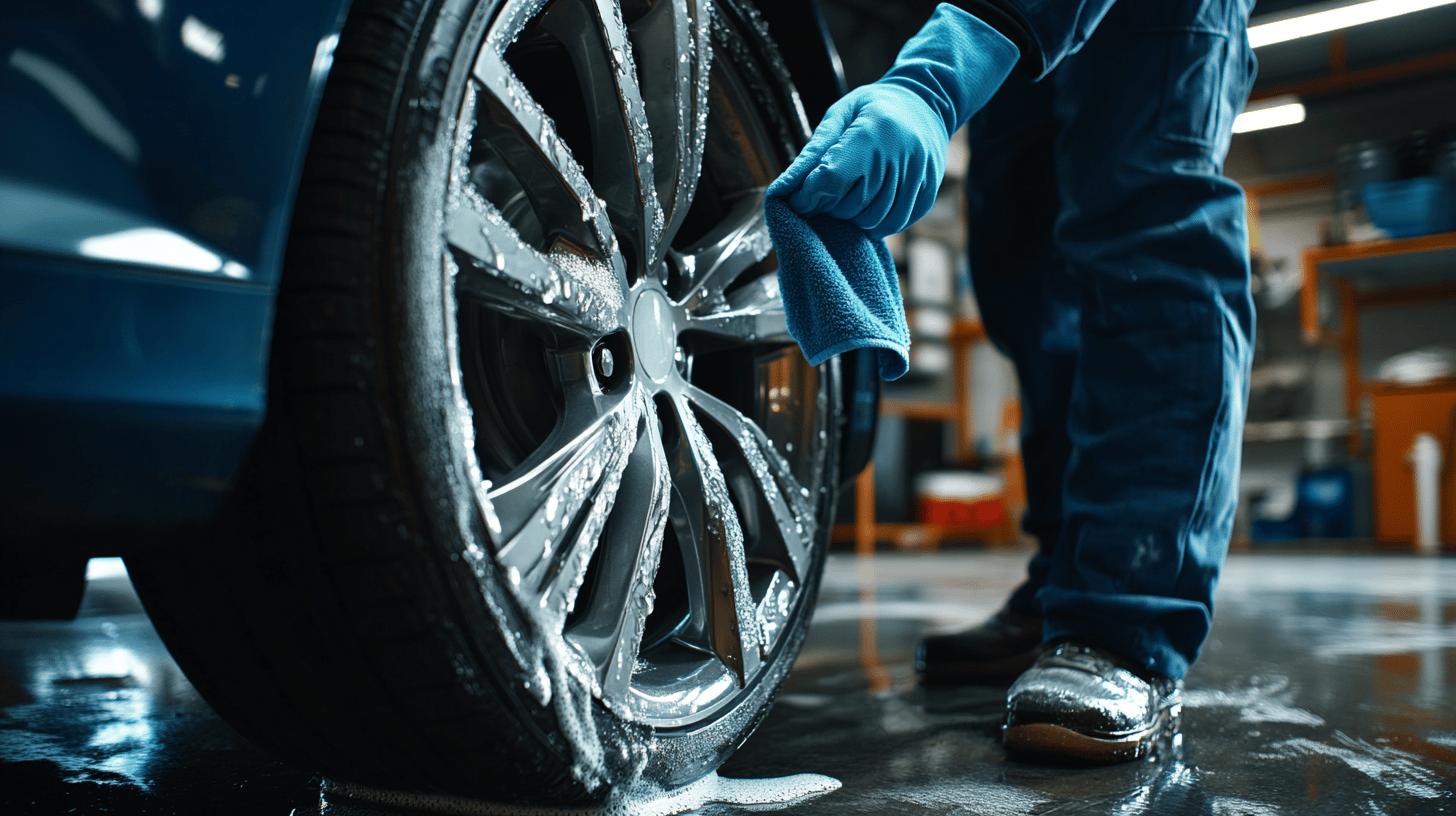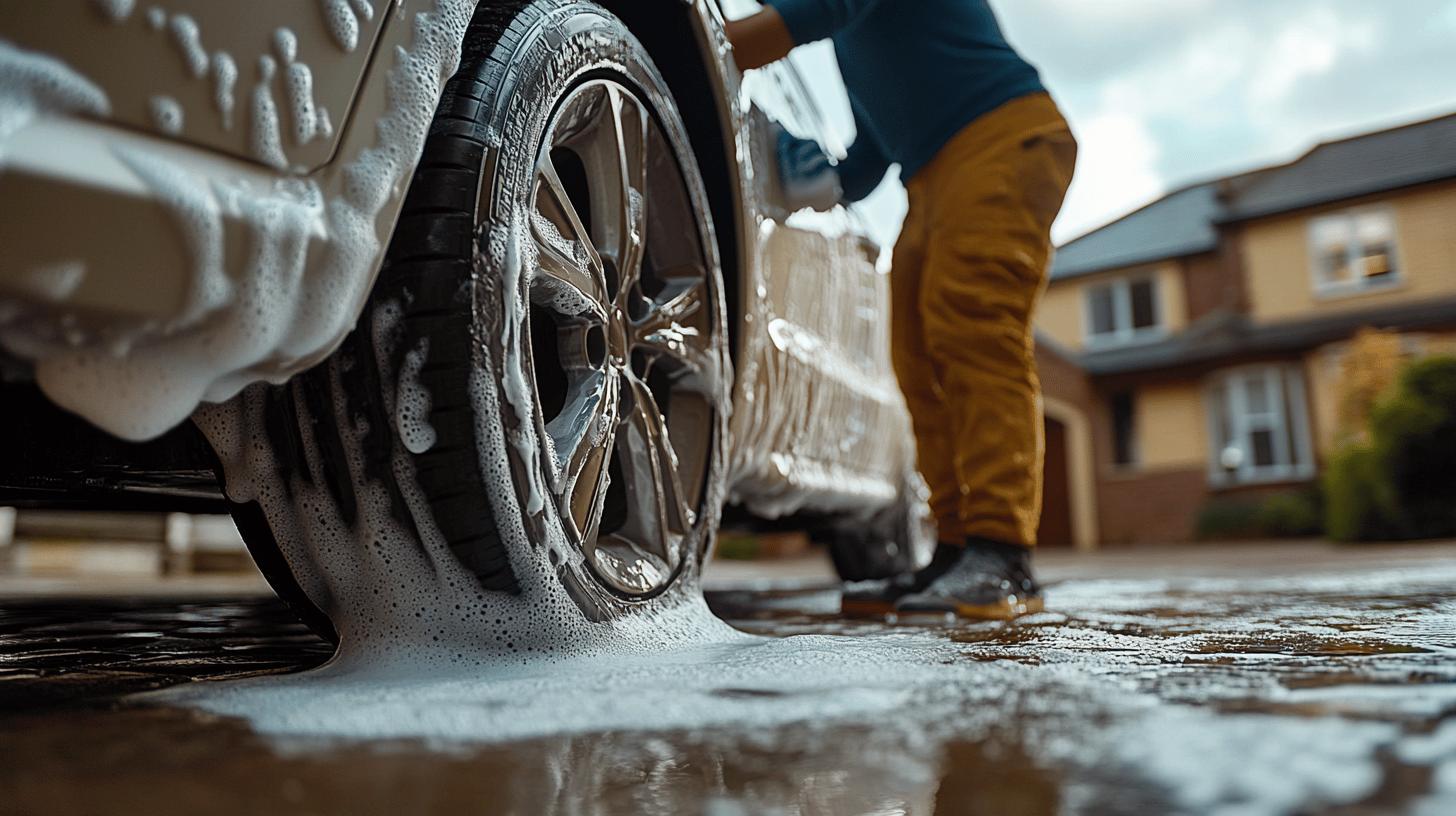Ever wondered why your alloy wheels lose their shine so quickly? Alloy wheels, while durable, require proper care to maintain their lustre and longevity. This guide will unlock the secrets to extending the life of your alloys, preventing common issues such as corrosion and unsightly damage. Let’s delve into the essential tips and products that can keep your wheels looking pristine and ensure they stand the test of time. Read on to discover how regular maintenance and the right techniques can make all the difference for your alloys.
Cleaning Your Alloy Wheels Properly
Regular cleaning of your alloy wheels is essential to maintain their appearance and longevity. By cleaning your alloys every 1-2 weeks, you can prevent the build-up of dirt, dust, and salt, which can cause corrosion and damage. The right tools are crucial for this task. Use a pH-balanced wheel cleaner, such as the highly recommended Stjarnagloss Hjul Colour Change wheel cleaner, to ensure you do not harm the wheel’s finish. Soft brushes are ideal for removing grime without scratching the surface. Always let your wheels cool thoroughly before starting the cleaning process to avoid any potential damage.
- Step-by-Step Guide to Cleaning Alloys:
- Spray the wheel cleaner evenly around the wheel area, using about ten sprays, and avoid direct contact with the brakes.
- Allow the cleaner to sit for a few minutes to break down dirt and grime.
- Use a soft brush to gently scrub the wheel, paying attention to hard-to-reach areas.
- Rinse the wheel thoroughly with water to remove all cleaning agents and loosened dirt.
- Dry the wheel with a microfibre cloth to prevent water spots and streaks.
Using pH-balanced products is vital to avoid damaging your wheels’ finish. Acidic or alkaline cleaners can etch or stain the surface, compromising the wheel’s integrity. Proper rinsing techniques are equally important. Ensure all cleaning agents are thoroughly removed to prevent residue build-up, which can attract more dirt. Consistent and careful cleaning will keep your alloy wheels looking their best and extend their lifespan.
Essential Products for Alloy Wheel Care
Using the right products is crucial for maintaining the appearance and longevity of your alloy wheels. The correct cleaners and tools can prevent damage and ensure your alloys remain in top condition.
A strong wheel cleaner is vital for effective maintenance. The Stjarnagloss Hjul Colour Change wheel cleaner is highly recommended due to its powerful, yet pH-balanced formula. This ensures that the cleaner is tough on dirt and brake dust but gentle on your wheels’ sensitive finishes. Soft brushes are another essential tool; they allow for thorough cleaning without scratching the surface. Applying a protective wax or sealant can further protect your wheels by preventing dirt and brake dust from adhering to the alloys.
An alloy care kit often includes all the necessary products: cleaners, brushes, and protective sprays. These kits are advantageous as they provide a comprehensive solution for alloy wheel care. By using a complete kit, you can ensure that each step of the cleaning and maintenance process is covered, from removing grime to applying protective coatings. This holistic approach simplifies the maintenance routine and helps in preserving the pristine condition of your alloy wheels.
Preventative Maintenance for Alloy Wheels

Regular maintenance is crucial for keeping your alloy wheels in top condition and extending their lifespan. Consistently checking for scratches, chips, and other damages can prevent minor issues from escalating into more serious problems. By maintaining a routine of inspecting your wheels, you can promptly address any signs of wear and tear. Additionally, cleaning your alloy wheels regularly helps to maintain their appearance and condition, ensuring they look their best at all times.
- Preventative Maintenance Tips:
- Inspect your wheels weekly for scratches, chips, and other damages.
- Clean your alloy wheels every 1-2 weeks to remove dirt, dust, and brake dust.
- Apply a protective wax or sealant after cleaning to prevent dirt and brake dust from adhering.
- Avoid harsh chemicals and abrasive tools when cleaning to protect the wheel’s finish.
- Drive carefully to minimise the risk of damage from curbs, potholes, and road debris.
- Address any damages promptly to prevent them from worsening.
Applying a protective wax or sealant provides an additional layer of defence against dirt and brake dust, making future cleanings easier and more effective. This step not only enhances the appearance of your alloy wheels but also helps to preserve their condition over time. Driving carefully is equally important; by avoiding curbs, potholes, and road debris, you can minimise the risk of damage to your wheels. Regular maintenance combined with these preventative measures will ensure your alloy wheels remain in excellent condition for years to come.
Protecting Your Alloy Wheels from Damage
Corrosion on alloy wheels can severely compromise their integrity and appearance. Ensuring your alloy wheels are protected from damage and corrosion is crucial for maintaining their performance and aesthetic appeal.
Applying a protective wax or sealant is an effective measure to prevent dirt and brake dust from adhering to the alloys. This layer of protection not only makes cleaning easier but also safeguards the wheel’s finish. Avoid using harsh chemicals and abrasive tools when cleaning your wheels, as these can cause scratches and damage the protective coating. Instead, use pH-balanced cleaners and soft brushes to gently remove grime without harming the alloy. Additionally, regularly inspect your wheels for any signs of wear and tear, and promptly address any issues to prevent them from worsening.
Driving carefully is fundamental in protecting your alloy wheels. By minimising the risk of damage from curbs, potholes, and road debris, you can extend the lifespan of your wheels. Regular maintenance, including cleaning and applying protective products, combined with cautious driving habits, will ensure your alloy wheels remain in excellent condition for years to come.
DIY vs. Professional Alloy Wheel Care
DIY alloy care offers several advantages, including cost savings and the convenience of performing maintenance on your own schedule. Regular cleaning, applying protective products, and handling minor repairs like scratches and kerb scuffs are tasks that can easily be managed at home. These activities, if done consistently, help maintain the alloy wheels’ appearance and prolong their lifespan. However, DIY care does have its limitations. While you can handle minor cosmetic issues, more serious damages like dents, deep scratches, and structural problems require professional intervention. Additionally, DIY methods might not always provide the same level of precision and thoroughness as professional services.
| Aspect | DIY Care | Professional Care |
|---|---|---|
| Cost | Lower | Higher |
| Convenience | On your own schedule | Requires appointments |
| Scope of Repairs | Minor scratches and kerb scuffs | Comprehensive, including dents and structural issues |
| Precision | Varies based on skill | High, with specialised equipment |
Professional alloy wheel care becomes essential when dealing with more severe damage that requires specialised skills and equipment. Mobile alloy repair services are available, offering convenience by bringing professional expertise directly to you. These services can handle comprehensive repairs, such as welding, cosmetic restoration, and fixing structural issues which can’t be addressed through DIY methods. Opting for professional care ensures precision and thoroughness, significantly extending the life and appearance of your alloy wheels. Professionals can regularly maintain and promptly repair any damage to prevent minor issues from escalating, ensuring your alloys remain in pristine condition.
Final Words
Maintaining your alloy wheels is crucial for both the aesthetic and structural quality of your vehicle.
From proper cleaning techniques using pH-balanced products to regular checks and preventative maintenance steps, each aspect plays a vital role.
Choosing the right products and understanding when to seek professional care also contribute to the longevity of your alloys.
By following these guidelines on how to care for your alloys, you’ll safeguard their condition and enhance your vehicle’s overall appearance.
Remember, regular care today can prevent costly repairs tomorrow, keeping your alloys in pristine condition for years to come.
FAQ
How do you take care of alloys?
Proper care includes regular cleaning every 1-2 weeks, using a pH-balanced wheel cleaner and soft brushes. Avoid using harsh chemicals or abrasive tools that can damage the finish.
What is the best way to protect your alloy wheels?
Apply a protective wax or sealant to prevent dirt and brake dust from adhering. Regularly inspect for damage and address any issues promptly to avoid long-term harm.
How do you keep alloy wheels from tarnishing?
Clean the wheels regularly with a pH-neutral cleaner and apply a protective sealant. Avoid exposure to road salt and harsh chemicals to maintain the wheel’s finish.
Does WD-40 clean alloys?
WD-40 is not recommended for cleaning alloys as it may harm the finish. Use a specialised pH-balanced wheel cleaner for best results.
What products are best for alloy wheel care?
Choose a strong, pH-balanced wheel cleaner like the Stjarnagloss Hjul Colour Change. Use soft brushes for cleaning and apply protective wax for added protection.
How often should I clean my alloy wheels?
Clean your alloy wheels every 1-2 weeks to prevent dirt, dust, and salt build-up. Regular cleaning helps maintain their appearance and condition.
Is it better to clean alloy wheels yourself or hire a professional?
DIY care is cost-effective and involves regular cleaning and minor repairs. However, professional services offer thorough cleaning, welding, and cosmetic repairs for extensive damage.
Why is regular maintenance important for alloy wheels?
Regular maintenance helps identify and address issues like scratches and chips promptly, preventing further damage and extending the life and appearance of your alloy wheels.

